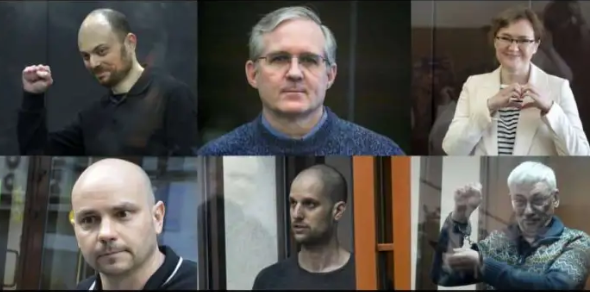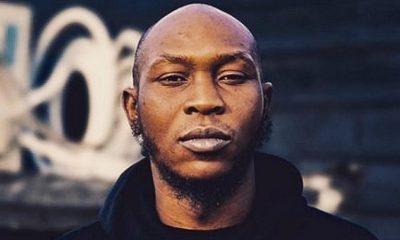News
Finally, Russia releases US journalist, other Americans, dissidents in massive 24-person prisoner swap

By Kayode Sanni-Arewa
The United States and Russia completed their biggest prisoner swap in post-Soviet history on Thursday, with Moscow releasing journalist Evan Gershkovich and fellow American Paul Whelan, along with dissidents including Vladimir Kara-Murza, in a multinational deal that set two dozen people free, officials said.
The trade followed years of secretive back-channel negotiations despite relations between Washington and Moscow being at their lowest point since the Cold War after Russian President Vladimir Putin’s February 2022 invasion of Ukraine.
The sprawling deal, the latest in a series of prisoner swaps negotiated between Russia and the U.S. in the last two years but the first to require significant concessions from other countries, was heralded by President Joe Biden as a diplomatic achievement in the final months of his administration. But the release of Americans has come at a price: Russia has secured the freedom of its own nationals convicted of serious crimes in the West by trading them for journalists, dissidents and other Westerners convicted and sentenced in a highly politicized legal system on charges the U.S. considers bogus.
Under the deal, Russia released Gershkovich, a reporter for The Wall Street Journal who was jailed in 2023 and convicted in July of espionage charges that he and the U.S. vehemently denied and called baseless; Whelan, a Michigan corporate security executive jailed since 2018 also on espionage charges he and Washington have denied; and Radio Free Europe/Radio Liberty journalist Alsu Kurmasheva, a dual U.S.-Russian citizen convicted in July of spreading false information about the Russian military, accusations her family and employer have rejected.
The dissidents released included Kara-Murza, a Kremlin critic and Pulitzer Prize-winning writer serving 25 years on charges of treason widely seen as politically motivated, 11 political prisoners being held in Russia, including associates of the late Russian opposition leader Alexei Navalny, and a German national arrested in Belarus.
The Russian side got Vadim Krasikov, who was convicted in Germany in 2021 of killing a former Chechen rebel in a Berlin park two years earlier, apparently on the orders of Moscow’s security services.
Russia also received two alleged sleeper agents who were jailed in Slovenia, as well as three men charged by federal authorities in the U.S., including Roman Seleznev, a convicted computer hacker and the son of a Russian lawmaker and Vadim Konoshchenok, a suspected Russian intelligence operative accused of providing American-made electronics and ammunition to the Russian military. Norway returned an academic arrested on suspicions of being a Russian spy, and Poland also sent back a man it detained.
Thursday’s swap of 24 prisoners surpassed a deal involving 14 people that was struck in 2010. In that exchange, Washington freed 10 Russians living in the U.S. as sleepers, while Moscow deported four Russians living in their homeland, including Sergei Skripal, a double agent working with British intelligence. He and his daughter in 2018 were nearly killed by nerve agent poisoning blamed on Russian agents.
Speculation had mounted for weeks that a swap was near because of a confluence of unusual developments, including a startingly quick trial and conviction for Gershkovich that Washington regarded as a sham. He was sentenced to 16 years in a maximum-security prison.
In a trial that concluded in two days in secrecy in the same week as Gershkovich’s, Kurmasheva was convicted on charges of spreading false information about the Russian military that her family, employer and U.S. officials rejected.
Also in recent days, several other figures imprisoned in Russia for speaking out against the war in Ukraine or over their work with Navalny were moved from prison to unknown locations.
Gershkovich was arrested March 29, 2023, while on a reporting trip to the Ural Mountains city of Yekaterinburg. Authorities claimed, without offering any evidence, that he was gathering secret information for the U.S. The son of Soviet emigres who settled in New Jersey, he moved to the country in 2017 to work for The Moscow Times newspaper before being hired by the Journal in 2022.
He had more than a dozen closed hearings over the extension of his pretrial detention or appeals for his release. He was taken to the courthouse in handcuffs and appeared in the defendants’ cage, often smiling for the many cameras.
U.S. officials last year made an offer to swap Gershkovich that was rejected by Russia, and Biden’s Democratic administration had not made public any possible deals since then.
Gershkovich was designated as wrongfully detained, as was Whelan, who was detained in December 2018 after traveling to Russia for a wedding. Whelan was convicted of espionage charges, which he and the U.S. have also said were false and trumped up, and he was serving a 16-year prison sentence.
Whelan had been excluded from prior high-profile deals involving Russia, including the April 2022 swap by Moscow of imprisoned Marine veteran Trevor Reed for Konstantin Yaroshenko, a Russian pilot convicted in a drug trafficking conspiracy. That December, the U.S. released notorious arms trafficker Viktor Bout in exchange for getting back WNBA star Brittney Griner, who’d been jailed on drug charges.
News
VeryDarkMan: NGO condemns arrest, maltreatment of activist

The Centre for Credible Leadership and Citizens Awareness, has condemned the manner in which Martins Otse, popularly known as VeryDarkMan was arrested and maltreated by the EFCC.
In a statement issued and signed on Monday by its Director General, Dr
Nwambu Gabriel noted that:
“We are compelled to issue this press statement in response to the distressing reports surrounding the recent arrest of human rights activist Martins Ortse, popularly known as VeryDarkMan (VDM), by the Economic and Financial Crimes Commission (EFCC).
The manner in which VDM was apprehended and treated is not only unacceptable but reflects a disturbing trend of impunity and abuse of power that undermines the human rights of Nigerian citizens.
VDM’s arrest, reportedly executed in a manner reminiscent of a military-style operation, stands as a stark violation of his basic human rights. Accounts of his treatment—being blindfolded, subjected to physical assault, and detained without adherence to lawful arrest procedures—are deeply troubling and invoke the principles enshrined in the Nigerian Constitution and international human rights laws. These actions are not merely procedural errors; they represent a fundamental disregard for the rule of law and human dignity.
*Key Concerns:*
1. *Violations of Human Rights*: The treatment meted out to VDM—torture, humiliation, and unlawful detention—contradicts fundamental rights guaranteed under the Nigerian Constitution, particularly the right to dignity, liberty, and fair hearing. Such actions are incompatible with both the Administration of Criminal Justice Act (2015) and international legal standards.
2. *Lack of Justification for Arrest*: The EFCC has failed to provide any legal justification for the reported actions against VDM. It is essential to remember that no individual is to be punished without due process. If the EFCC has evidence of wrongdoing, they must adhere to legal protocols and ensure that VDM is charged in a court of law, affording him the opportunity for defense.
3. *Repercussions on Nigeria’s Global Image*: The actions of the EFCC in this case potentially disgrace Nigeria on an international level. Such behavior can undermine the country’s reputation and portray it as a place where dissent is met with repression rather than dialogue. The importance of upholding human rights cannot be overstated in preserving Nigeria’s standing in the community of nations.
In light of these grave concerns, we call upon the Economic and Financial Crimes Commission to take immediate action by:
1. *Releasing Martins Ortse (VeryDarkMan) forthwith* if there are no formal charges against him.
2. If charges exist, the EFCC must promptly charge him in a competent court, ensuring that all legal rights are upheld and that he receives just treatment in accordance with the law.
3. Ceasing all forms of intimidation and harassment against individuals who engage in constructive criticism or activism, as this undermines the democratic values that Nigeria purports to uphold.
The Centre for Credible Leadership and Citizens Awareness stands firmly against any form of dehumanization and violence perpetrated against citizens, particularly those exercising their fundamental rights to freedom of expression and assembly. We urge the EFCC to rectify the current situation, display accountability, and restore faith in the institutions meant to serve the Nigerian people.
Sincerely,
Nwambu Gabriel, Ph.D.,
Director General
Centre for Credible Leadership and Citizens Awareness
News
Nigeria Targets Electricity Access for 300 Million Africans by 2030 – Speaker Abbas

By Gloria Ikibah
Speaker of the House of Representatives, Rep. Tajudeen Abbas has said that Nigeria is taking a frontline role in the push to expand electricity access across Africa, to help power about 300 million people on the continent by 2030.
The Speaker disclosed this while delivering the keynote address at the First Legislative Conference and Expo on Renewable Energy, organised by the House Committee on Renewable Energy, in collaboration with the United Nations Development Programme (UNDP) held in Lagos on Monday.
The conference brought together lawmakers, industry stakeholders, and development partners to explore renewable energy solutions and legislative frameworks for boosting access and affordability.
Abbas praised President Bola Tinubu’s approval of a $1 billion funding package for Nigeria’s Rural Electrification Agency in December 2024, and described it as a major boost for energy inclusion.
According to him, Nigeria’s participation in the Mission 300 initiative, a joint effort with the World Bank and African Development Bank demonstrates the country’s growing commitment to clean, sustainable energy for underserved communities.
He said: “This initiative speaks to Nigeria’s readiness to lead by example on the continent. It is about more than power, it is about development, opportunity, and progress.
News
Court delivers another judgement in favor of Amaewhule, others on Rivers Assembly crisis

By Kayode Sanni-Arewa
A Federal High Court in Port Harcourt has dismissed a case brought by lawmakers loyal to Rivers State Governor Siminalayi Fubara, challenging the positions of 27 State House of Assembly members that defected from the Peoples Democratic Party (PDP) to the All Progressives Congress (APC).
The ruling was delivered by Justice Emmanuel Obile, who explained that the lawmakers, led by Speaker Martins Amaewhule, remain valid members of the House.
This follows an earlier Supreme Court decision in February that had also refused Governor Fubara’s push to remove the defected lawmakers.
Governor Fubara’s legal team, headed by Yusuf Ali, had already withdrawn the appeal at the Supreme Court, stating that new developments had overtaken the matter.
The Rivers Assembly, represented by Wole Olanipekun, did not oppose this withdrawal.
The case at the Federal High Court was filed by three pro-Fubara lawmakers — Victor Oko-Jumbo, Adolphus Orubienimigha, and Sokari Goodboy Sokari — who asked the court to declare the seats of the 27 lawmakers vacant since they left the PDP, the party under which they were elected.
But the court ruled that their defection did not break any constitutional rule that would force them out of office.
“This court cannot close its eyes to the binding precedent of the Supreme Court, which in February recognised the leadership of the Rivers State House of Assembly under Speaker Martins Amaewhule. That decision, being from the apex court, is final and conclusive,” Justice Obile ruled.
Speaker Martins Amaewhule reacted positively to the judgment, saying it confirmed their right to stay in the Assembly.
Meanwhile, Governor Fubara’s supporters were disappointed by the decision.
This ruling marks another chapter in the political struggle between Governor Fubara and the pro-Wike faction of the Assembly, a conflict that has been ongoing since the December 2023 defections.
For now, the pro-Wike lawmakers have secured some breathing room, even as tensions continue between both camps.
-

 News8 hours ago
News8 hours agoWhy ‘VeryDarkMan was arrested – EFCC
-

 Economy18 hours ago
Economy18 hours ago75.5% of rural Nigerians now live below poverty line — World Bank
-

 News19 hours ago
News19 hours agoMassive turnout as Bishop David Abioye holds first service in new church + Video
-

 Entertainment7 hours ago
Entertainment7 hours agoHow I narrowly escaped death in U.S hotel room – Seun Kuti
-

 Education10 hours ago
Education10 hours agoOver 1.5m candidates score less than 200 in 2025 – UTME
-

 News19 hours ago
News19 hours agoHow US-Based Yoruba Monarch Died After Brutal Assault In Oyo Palace, Allegedly Ordered By Alaafin Amid Supremacy Row With Ooni Of Ife
-

 News9 hours ago
News9 hours ago‘S3x is good, I enjoy it,’ Bishop Adejumo tells wives
-

 News18 hours ago
News18 hours ago‘Cabals’ still fighting against our refinery — Dangote






